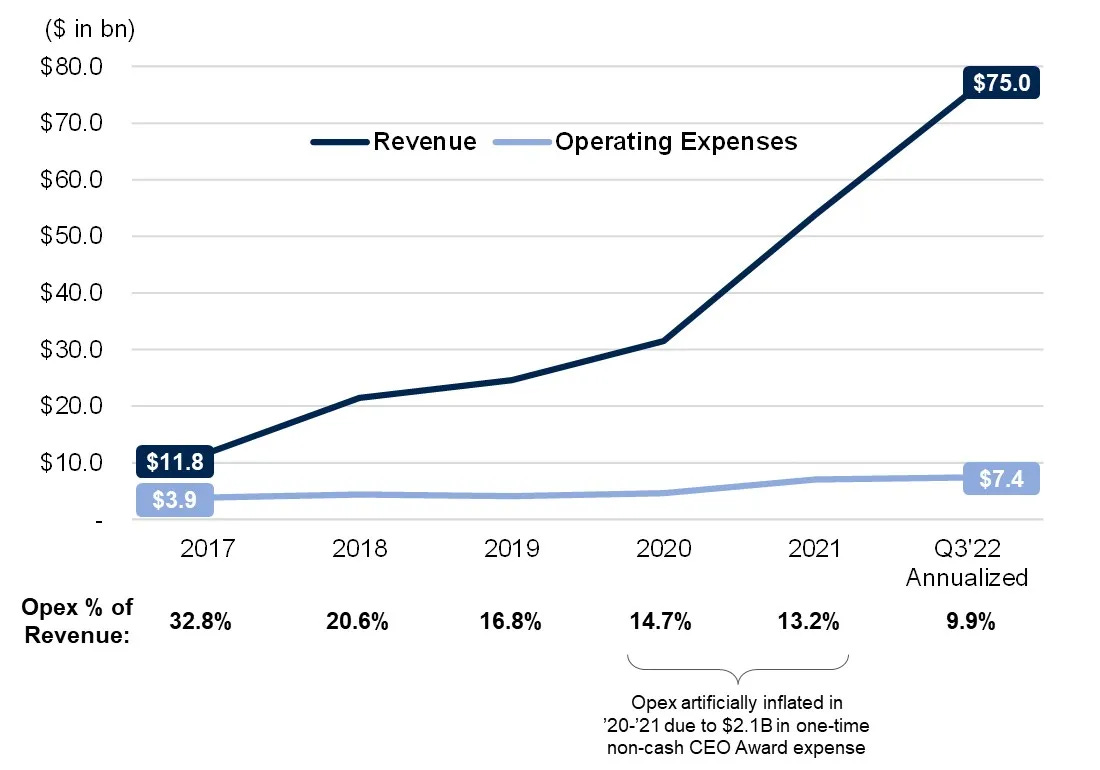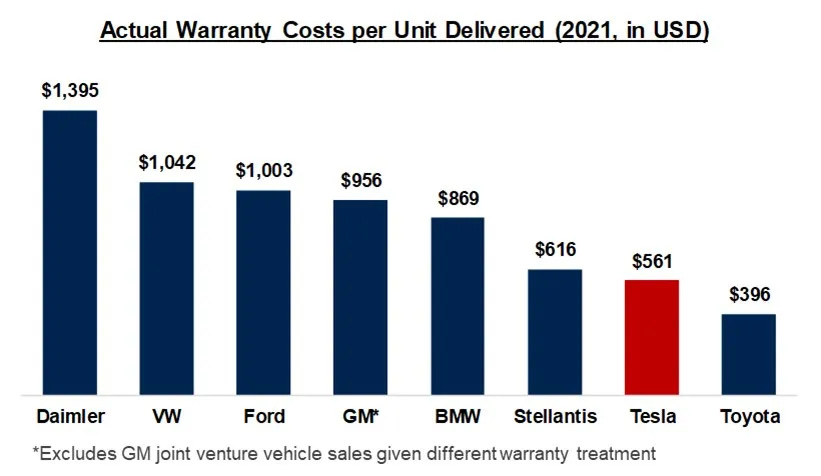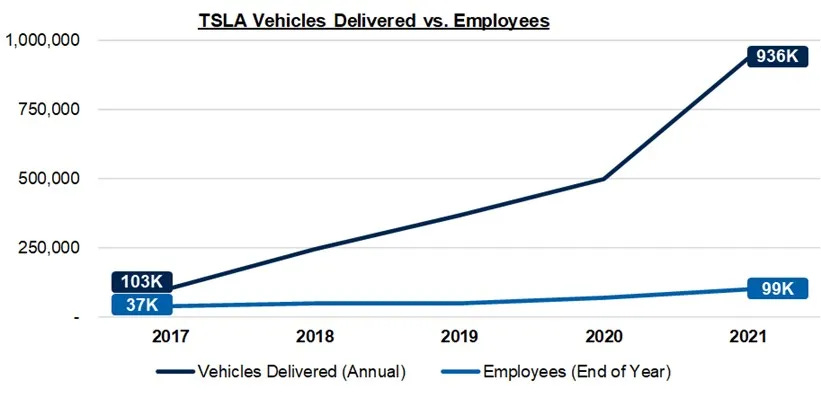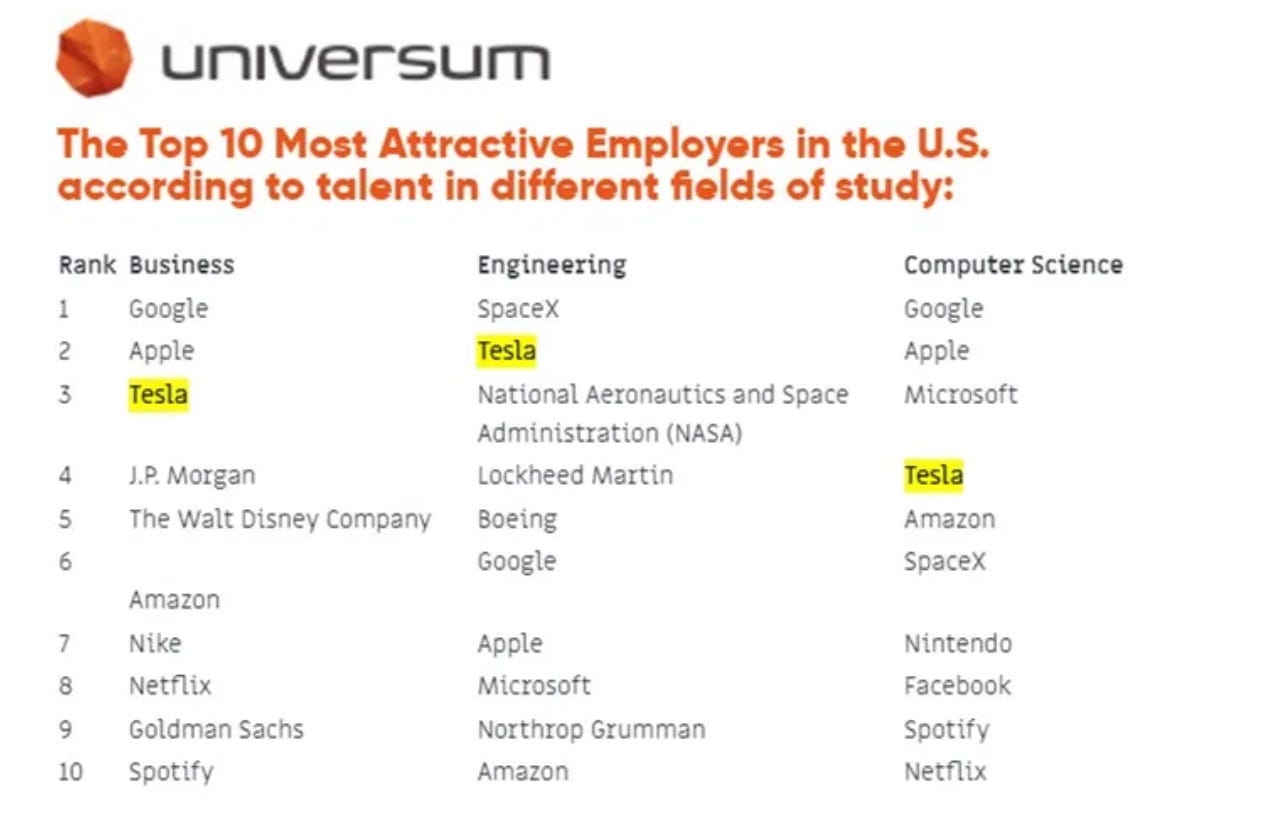How has Tesla generated unparalleled operating leverage?
+ The Little Things that Get You Promoted
Tesla’s 10x Revenue/OpEx is world’s apart from Toyota & Volkswagen’s 2x. It’s unparalleled operating leverage:
Part of this is producing 1/10th the cars. But more so it’s a revolutionary approach to cost control, one Elon exhibits at SpaceX too. It speaks to the unique way he runs his companies - and is worth studying.
Let’s start with the Finance 101:
OpEx = SG&A (Sales, General, & Admin)
+ R&D (Research & Development)
OpEx notably excludes CapEx (large buildings or machines) and COGS (cost of goods sold).
With this out of the way, let’s jump into how Tesla does it. Elon runs companies with high CapEx and COGS but keeps OpEx low as he scales. Four key factors are at play:
1. Funding R&D
Most technology companies sell a product and then invest billions in funding another. Facebook and Instagram Ads fund the Metaverse at Meta, for instance. Not Tesla. Where Meta spends 21% of revenue on R&D, Tesla spends 5%. Tesla’s R&D is funded by customers.
100,000 customers paid $10K+ for full-self-driving. That funding is enough to cover the Tesla Optimus robot too. Tesla was able to increase R&D 71% in 2021, but keep the proportion of revenue the same. It’s funding those R&D increases with revenue increases.
2. Increasing reliability of cars
Tesla has taken the warranty costs of its vehicles down from $1200 in 2017 to $550 in 2021. The cost to servicing isn’t actually part of operating expenses. It goes in “cost of revenue” or COGS.
But it is a very important figure, because $1200 is industry leading. And $550 is near the industry low. The lower the warranty cost, the less SG&A associated with it.
And the more reliable the cars, the better they sell. Which helps with the next point:
3. Little to no paid advertising
Your average big company is paying heaps in paid advertising or sales:
Super Bowl Ads and billboards for consumer companies
Highly paid sales reps in B2B companies
This bloats the S(ales) in SG&A.
Tesla has had a revolutionary marketing strategy. It relies heavily on Elon and the product itself. Instead of physical dealerships, most sales happen online. So it can keep sales costs really low. It’s a ‘product-led’ growth company.
4. Relatively slow headcount growth
Most companies swell in size as they grow. We all heard about Amazon hiring a million workers in 2021. Tesla stays very lean. It 9x’d cars delivered while only 3x’ing staff. So it still has <100K employees.
The company is a highly desired company to work for. Top 10 amongst all companies in most surveys. This allows it to hire 10x employees. Tesla generally asks a lot of them, demanding at least 40 hours a week in the office. It all adds up to a huge cost advantage.
This operating leverage is really important for Tesla. It allows Tesla to continue to grow into profitability. Most tech companies would bloat costs in all areas: R&D, sales, headcount. Tesla’s discipline puts it in a totally different financial profile than competitors. And that shows up in its valuation multiples.
Tesla’s cost control is not just unique to operating expenses. In the last 5 years, Tesla has increased margins from 18 to 30%. While ASPs decreased 50%. It’s COGS discipline, too.
Takeaways: Elon’s unique approach to cost control is revolutionary. Most companies spend too much on R&D + SG&A. Tesla doesn’t. As a result, it has unparalleled operating leverage.
The Little Things that Get You Promoted
It's not <all> glam and flashy releases that take you to the next level.
It's:
Doing what you say
Putting the business first
Being a friendly teammate
Up-leveling those around you
Fitting into your team's culture
Little differences (tenths of a percent) matter.
1. Doing what you say
There's the dependable that will get the job done. There's the dependable that will get it done when they say. And then there's the dependable who do everything they say or updated you that they wouldn't.
Leaders expect mistakes and delays. But they can't tolerate brushing under the rug. Being dependable means proactively following up when things change. It's being that tenth a percent more dependable. Leaders love to promote the most dependable people.
2. Putting the business first
There's a myriad opportunities daily to do what's right for you. But do you do what's right for the business?
Let's take graduating a feature with neutral impact as an example. It's a classic case of "good for you, but not the business." Many wouldn't graduate. That's putting the business first. It's a good start, and gets you along the scale.
But there's more, those who go the extra step. They don't grow their team when times are tough. They sacrifice their time for others. Putting the business first MORE matters. The tenths of a percent make you that much more a requirement to promote.
3. Being a friendly teammate
There's being friendly and then there's being really friendly. 50% of people just aren't on the friendly spectrum to begin with. They're hard to work with, take credit but not blame, and slow down meetings. They are easy not to promote.
Then there's this whole world of friendly teammates. The vast majority are what Adam Grant calls "matchers." They match friendly behavior. But there are some who are more "giver than matcher." As you move up on this spectrum, you become someone others advocate to promote.
4. Up-leveling those around you
The people who get promoted fastest are constantly exhibiting little things to make others better.
They model great behavior. They exhibit exquisite craftsmanship. They set up assists to help others shine. They don't just work to get things done, but they improve the artistic process of getting there.
Little differences in the scale add up to big differences come promotion consideration time.
5. Fitting into your team's culture
Even if you are doing all of the above, it's critical to be a "culture carrier." There's little small gradations that really make the difference. The most common mistake is to bring along the old culture of your old job.
It's critical to fit into the quirks that matter to your team. Some may care about writing. GASP. Some may care about social events. GASP. Some may care about responding off hours. GASP. Those who get promoted read these idiosyncrasies and excel.





